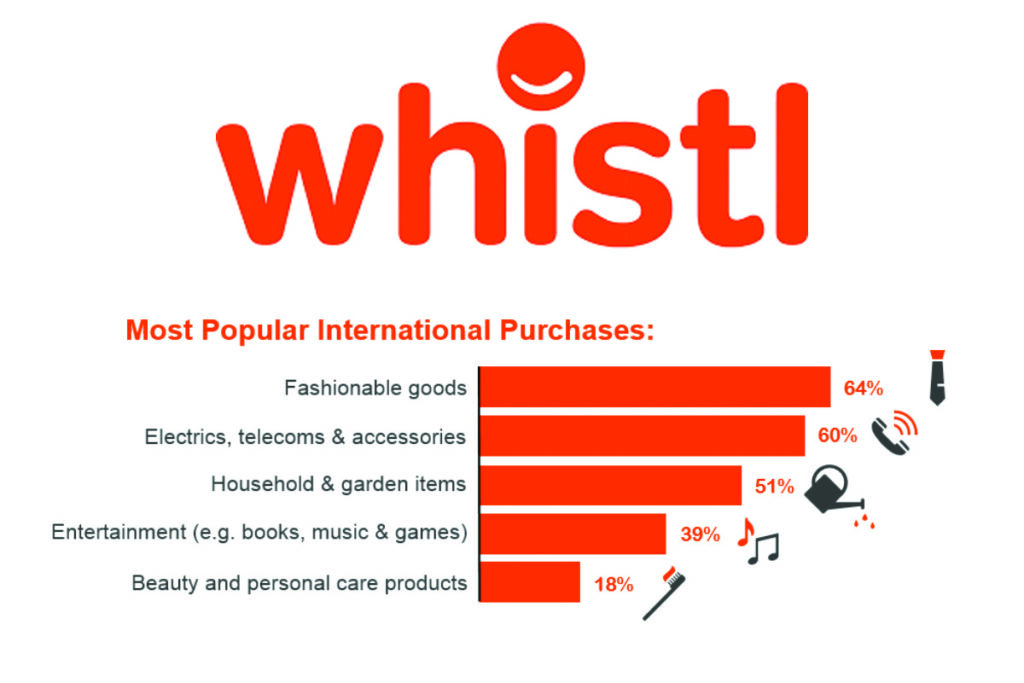Whistl has undertaken a survey to understand the international online purchasing behaviour of consumers in the UK, Republic of Ireland, France, Germany, Australia and the USA. It found that making cost savings was the biggest driver for consumers for cross-border purchasing (64%); followed by getting products not available locally (60%); then getting access to unique products (51%); as well as getting low/free shipping (39%).
On a country specific basis, Ireland and Australia have the highest proportions of online purchasers from abroad of all the countries surveyed and, relative to the other countries, both have significantly higher proportions who mention cost savings and low shipping.
The research found some minor cross-border purchasing differences based on gender, with slightly more men mentioning the exchange rate, cost savings and availability of new technology as the reasons for making online purchases abroad and slightly more females saying product access, shipping and fashion trends motivate their international shopping behaviour.
When looking at drivers of cross-border purchasing behaviour by age, older shoppers are less bothered by cost savings compared to their younger counterparts, who mention product quality, product availability and access to technology more so than older purchasers.
When looking at purchases by age, older shoppers are less bothered by cost savings and younger shoppers mention product quality, product access, access to technology as their drivers of international behaviour.
Barriers to cross-border purchasing
For retailers, understanding why people do not make international online purchases is equally as important when building their market share. Across all countries the top concerns of buying online from abroad were delivery times (67%); risk of fraud/low quality (52%); cost and complexity of returns (46%); followed by delivery costs (36%).
Long delivery time concerns are highest in UK and Australia and lowest in Ireland (where risk of fraud is also perceived as low but this could be due to the fact that a large proportion of Ireland’s international purchases come from the UK). In France, purchasers are less concerned with delivery costs and lack of trust compared with other countries. Germans are more concerned than other countries with fraud risk, returns, and delivery costs.
The USA has the highest lack of trust rating among the countries surveyed, with 40% citing distrust with overseas sellers as a negative when making international online purchases.
When analysed by gender, women see the risk of fraud as a significantly higher disadvantage compared to men.
Where do we buy from?
China topped the list for 5 out of 6 of the countries surveyed, the exception of the surveyed list was the Republic of Ireland who bought the majority of items from the UK.
Most Popular Countries for Cross-Border Purchasing
|
|
|
|
|---|---|---|---|
| Australia | China | USA | UK |
| France | China | UK | Germany |
| Germany | China | Austria | UK |
| Republic of Ireland | UK | China | USA |
| United Kingdom | China | USA | Germany |
| United States of America | China | UK | Canada |
China took a significant lead across all the product categories with more buyers purchasing items than the other countries. The UK ranked 2nd and USA 3rd amongst the countries surveyed.
Proximity in geographical locations also impacted purchasing patterns with the Republic of Ireland purchasing the most from the UK, the USA purchasing from Canada and Germany are purchasing goods from Austria.
Influence of marketplaces on cross-border purchasing
Amazon and eBay dominated in all the countries surveyed. Amazon was most popular in France, Germany, and the UK with over 70% purchasing from the online retailer. In Australia only 41% used the site in the last 12 months, however, eBay (69%) was more popular with Australian shoppers. Wish was the most popular marketplaces in the Republic of Ireland and Australia, with AliExpress cited as the most popular in France and in the Republic of Ireland.
The research also looked at the influence of buying platforms on international online purchasing behaviour. In the UK and Ireland shoppers using Amazon care less which country the product is coming from, when compared to countries such as France.
When it comes to eBay, online shoppers in the US and UK are significantly more wary about buying from abroad using this platform in contrast to shoppers in Australia and Ireland who are more relaxed.
“When trading internationally online you have to take a country by country approach and adapt your marketing strategy accordingly. Our research shows that even though there are some common themes across all markets, there are some significant differences that need to be addressed to maximise the potential in specific countries.
Working with a partner who understands how to maximise the opportunities abroad, particularly for SME etailers, is invaluable. We have produced a guide to provide insight into the key international online markets and the drivers of behaviour of consumers in these markets.”
– Melanie Darvall, Director Marketing & Communications, Whistl










